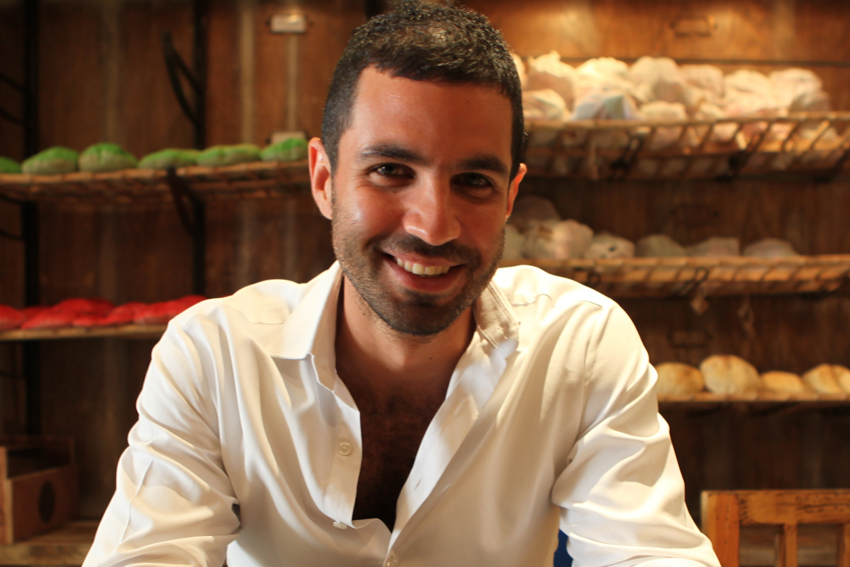Relishing a challenge and convinced there was a demand not being catered to for upmarket street food in cool cafés rather than street-side stalls, Chris Khalifa, founder and CEO of Zooba, has added a gourmet twist to traditional dishes and brought old favorites indoors, and reflects a new generation of Egyptian entrepreneurs changing the business scene.

One enterprising Egyptian entrepreneur has turned the tables on the growing trend in cities around the world of food trucks taking fine dining out of the restaurants and onto the streets. Instead, he decided to take Cairo’s street food indoors, adding more than a dash of style and a gourmet twist to traditional fare to create a unique culinary experience and a flourishing brand with aspirations of raising Egyptian food’s profile internationally.
Zooba opened its first café in March 2012 in Cairo's upmarket Zamalek neighborhood and four more have since sprouted up in Heliopolis, Maadi, Rehab, and Katameya.
The distinctive cafés blend vintage and contemporary Middle Eastern aesthetics and use reclaimed local materials and discarded objects “to create an eclectic dining space that pays homage to the creative resourcefulness and colorful spirit of the Egyptian people.”
“The idea behind Zooba is that we wanted to create a brand around Egyptian street food,” says founder and CEO of Zooba, Chris Khalifa.
The concept is quite simple as Egyptian food is embedded in Egyptian culture, especially street food. The dynamics are quite straightforward. Street food in Egypt is consumed on the street, as with anywhere else.
However, this type of food can be enjoyed in a more hygienic fashion, with better ingredients, with more innovation in the recipes and the ideas behind how the menu is structured, etc.”
Zooba serves up traditional street sustenance with a flourish: professionally trained chefs use top-quality, locally sourced ingredients to prepare dishes such as classic koshari and ful sandwiches to spinach-infused baladi bread or blowtorch-roasted sweet potatoes.
Mr Khalifa’s business partner Mostafa El Refaey is a US-trained chef who traveled the length and breadth of Egypt mastering local recipes, searching for quality ingredients and discovering new flavors to spice up long-standing favorite staple dishes.
“We built a brand around three values: ingredient quality, innovation of the menu, and a more hygienic experience,” says Mr Khalifa.
“We wanted our customers to trust what they are eating. This was kind of what started the idea. We didn't reinvent anything, the same trend has happened with street food all over the world.”
The success of Zooba reflects the ingenuity and enthusiasm of a new generation of start-ups and entrepreneurs reshaping Egypt’s post-revolution business climate.
Breaking away from a traditional culture ingrained with aspirations of steady employment in the public sector, today’s Egyptian youth are channeling pent-up entrepreneurial energy into going it alone.
Such a shift in the nation’s mindset is still in its early stages, but cultural perceptions are changing, with famous international entrepreneurs becoming role models.
“It’s a big call to make as this culture is embedded in the entire bureaucratic system,” comments Mr Khalifa.
Despite complex and challenging laws and procedures regarding start-ups, the government is attempting to bring down such barriers and encourage more investment and activity in the private sector, not least to reduce the country’s unemployment rate.
Initiatives such as Endeavor Egypt, which encourages high-growth entrepreneurship and served as a knowledge partner at the 2015 Egypt Economic Development Conference, and RiseUp Summits of 2013 and 2014 shine the spotlight on the nation’s burgeoning start-up scene.
Global Entrepreneurship Monitor reports that 2.2 million Egyptians have become owners of new businesses since 2011.
Jawad Nabulsi, Egyptian entrepreneur and CEO of the Nebny Foundation, holds the number one spot in the 2015 Arabian Business Power List, a guide to world’s 100 most influential young Arabs under 40.
A total of 10 Egyptians feature in this year’s list and are prominent in activities such as culture, media, construction, finance, entertainment and tourism.
Furthermore, in an interview with the BBC earlier this year, Professor of Economics at Cairo University Alia El Mahdi highlighted the rise in women starting their own businesses and that the current rate of 11% of Egyptian entrepreneurs being women contrasts with just 3% only eight years ago.
“Gaps in the market exist,” says Zooba’s Mr Khalifa. “What has suddenly become a topic is the sense that we have some incubators – such as Endeavor Egypt – who have a presence, marketing power and a voice that is starting to be heard. Now we are hearing more of entrepreneurship.
We're just starting to incubate entrepreneurs and where that will lead will still take a number of years.
“We are in the beginning stages. At least we have the seeds of something in place. Entrepreneurship in the United States is embedded in the culture.
Eight year-olds sell lemonade at a stand outside the house. Egypt needs to get there.”
Mr Khalifa adds that he is looking to establish Zooba firmly in Egypt and the region before rushing into expanding further afield.
“The concept can be copy-pasted in the Gulf but not to New York. The consumer in New York would need to be better informed about a number of things. What we consider breakfast in Egypt is not remotely considered breakfast in the United States.”
Identifying global trends and applying an Egyptian take on them, with an eye on eventually entering international markets, is an attribute echoed by other start-ups on the rise in Egypt, and one that will further change the perception of the nation’s potential.
0 COMMENTS